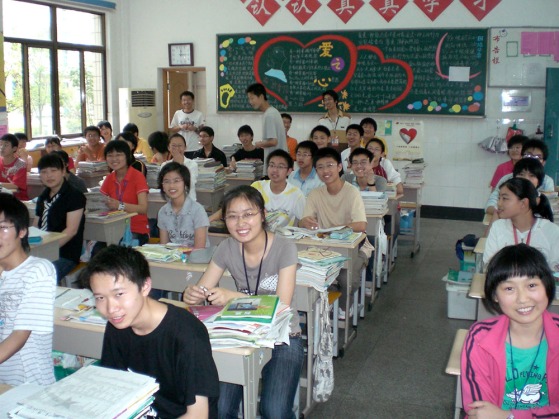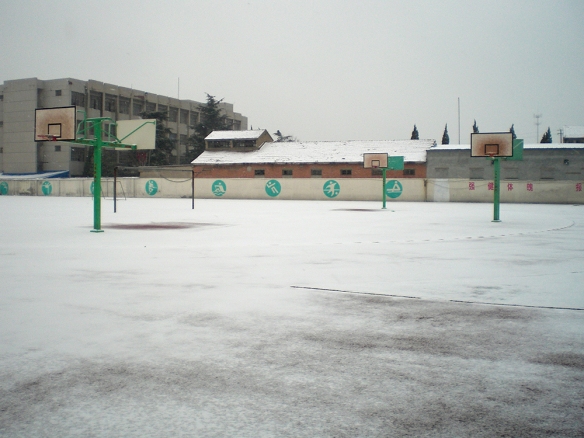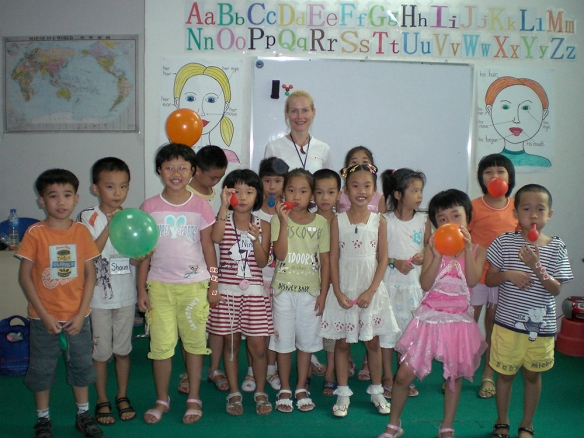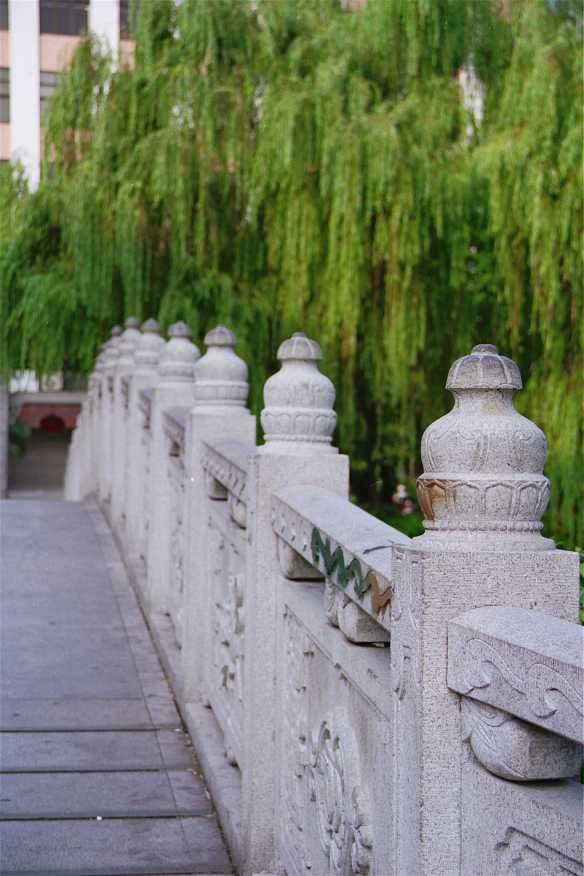Back in Ben’niu, Siso, one of my students, invites me to a family lunch. We’re at Aunt’s house because, she confides, Mother is a bad cook. Aunt assembles a banquet that includes two soups, various in-season vegetable dishes, gong bao ji ding (because Siso remembered it was my favourite dish), marinated jellyfish and a meat similar to corned beef. Siso points to the meat then shows me her electronic dictionary: donkey.
Over lunch Siso translates her family’s questions and comments at her discretion. Why are you so skinny when most foreigners are fat? Do you think Chinese babies are cute? Do you like living in China? Aunt vehemently explains that China has many poor people who do not understand how to behave around foreigners and she apologises if someone from China has behaved badly toward me during my time here.
Siso speaks candidly about her family as they sit around the table, right in front of us.
‘My father is fat and lazy, and he never helps around the house. My mother must cook and do all the housework even though she works too. Chinese men don’t do housework. That’s just the way it is. Do you think Cousin is good looking? I think it’s cool that Cousin has three girlfriends. I had a boyfriend in Shanghai last year but now we’re broken up. I love learning English. I want to study English in Canada but my father doesn’t want me to leave. He thinks I won’t study hard in another country. But, if I get good grades, he says he will think about it.’
***
In Shanghai, China’s largest city with a population bordering on 19 million, I embrace the rush of people, the plethora of restaurants, the multitude of towering malls. What once suffocated me now resonates within.
***
In English Corner today it is revealed that MP3s, iPods, mobile phones, laptops and love are banned at high school. If the electronics are discovered, they’re confiscated. If the relationship is discovered, the two students are suspended and sent home.
***
Chris, a teacher-friend from Foshan, comes to visit. We haven’t seen him in almost two years. He spent the past year in Australia but found the people, and the lifestyle, too materialistic and so has returned to China for the sense of community and the freedom that the way of life here offers.
***
I’m sitting at my desk writing an email when the study door starts to gently swing on its hinges. I stand and stumble slightly. Images of the ceiling collapsing around me tumble through my mind. Ash calls from school; he feels it too.
It’s not until the next day that we learn of the Sichuan earthquake some 1500 kilometres away. At the epicentre in the mountainous region of Wenchuan, and in nearby cities and towns, the devastation is incomprehensible. More than ten thousand are dead, countless buildings have been destroyed and several schools’ classrooms have collapsed, killing thousands of children. There are reports that one thousand students at one school, and nine hundred at another, were killed because of faulty construction work. The death toll eventually rises to 70 000 and approximately 4.8 million people are left homeless.
We have teaching friends based in the Sichuan capital, Chengdu. It’s been a week and still no word. Finally, on May 22, ten days after the earthquake, I receive an email from Rowena:
The aftershocks continue and the death toll increases, even as I sit here typing. I’ll know they’ve subsided completely when we stop noticing new cracks in our apartment. The old cracks from the initial earthquake seem to get longer and wider every time we come home. The city is still bustling with aid vehicles, soldiers and ambulances, and disease prevention teams are spraying everything they can find with hopefully non-toxic disinfectant. Life goes on, as many residents choose to remain in tents around the city, including many of the hospitals that moved their patients into tents, and everything appears to be as normal as can be.
***
Our classes are cancelled, without warning, a month before the semester’s end. Such is the nature of things in China. With their mid-semester results below district-average, the students must do extra study in preparation for their next-level exams.
Relaying this news to my students, all 450 of them, is an emotional moment, one that I repeat seventeen times for seventeen classes. By the last class I’m no longer capable of bravery or stoicism. Tears roll freely down my cheeks and my voice trembles as I announce that our classes are terminated.
‘You’ve been wonderful students… I’ll miss you all very much.’
The bell rings. Class is over.
A cluster of girls surrounds me. Some offer slips of paper with email addresses, several cling to me in a group hug, and others cry, unable to say a word.
‘Thank you,’ I say in a choked whisper.
Released from our contract, Ash and I decide to return to Australia to study, to get a degree; we want to improve our teaching options for the future. Ash hasn’t seen his family in six years and so, while we would both prefer Melbourne, we move to Bunbury.
***
Everyone looks so pale. And big. And fat. In Coles I stare at the wall of bread for so long that a shop assistant asks if I am okay. It takes me two hours to do the grocery shopping—reunited with products that I haven’t seen in three years I simply can’t decide what and which brand to buy.
Ash and I forget that others can understand us. We make inappropriate comments in public. People glare at us. The ‘foreigners’ here are abrasive, unfriendly, wasteful. I now understand why the Chinese think all foreigners are rich—the people here have so much and want ever more: two cars instead of one; houses with swimming pools, games rooms, home theatres and big screen televisions; and children demand mobile phones, iPhones, iPods, iPads, computers, designer label clothes and money for just ‘hanging’.
One night we go to a local Chinese restaurant. The waiter speaks Chinese and the majority of customers are also Chinese. The room sings with the chatter of Mandarin and the click of chopsticks. I smile at Ash; it’s the first time in a month that I’ve felt comfortable in Australia.





